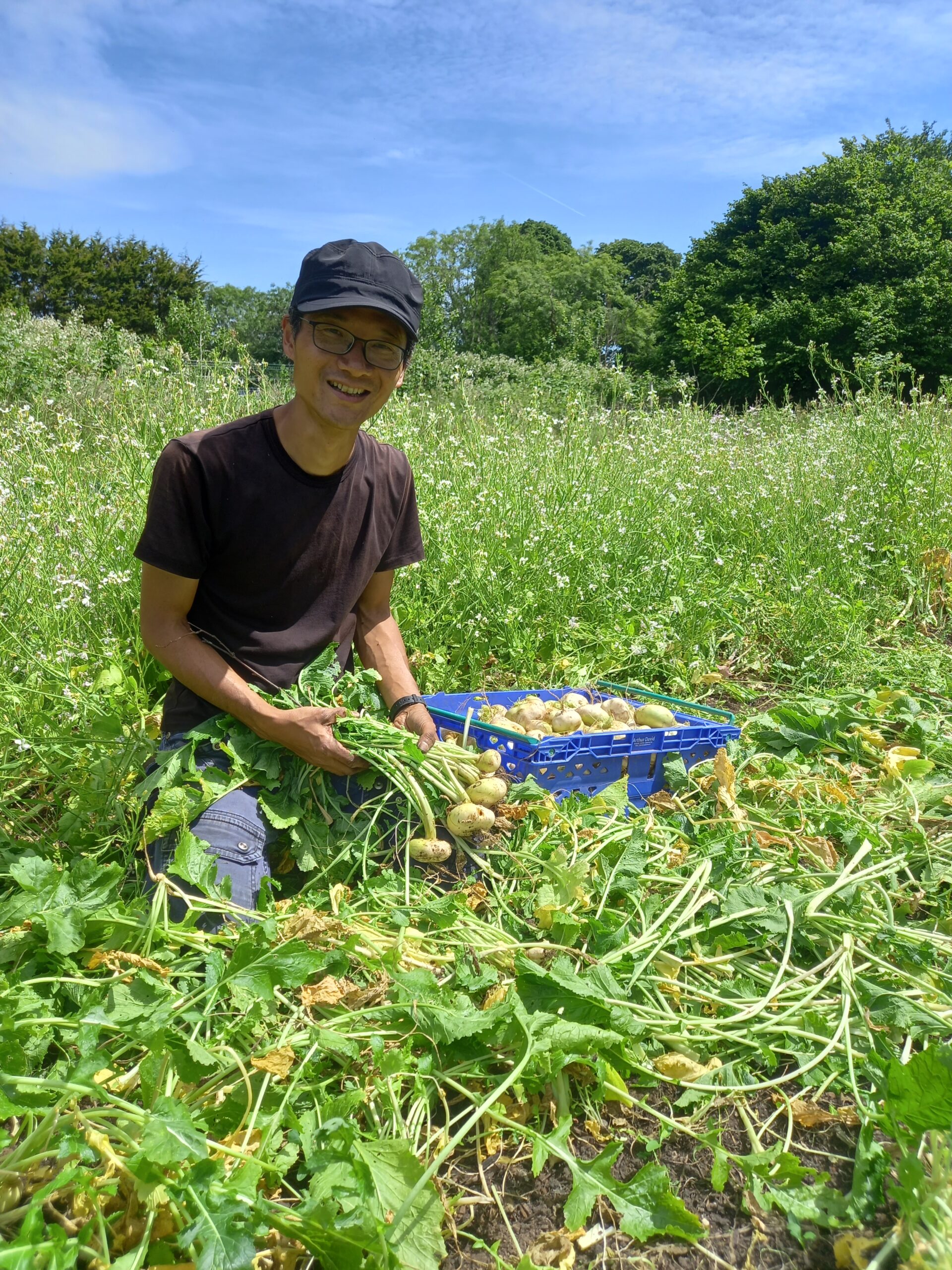
Written by Hannah Shepherd for Bristol Good Food 2030.
Volunteer Hannah Shepherd (pictured below) meets community grower Angus Lam in the latest Bristol Good Food 2030 story. Angus and his family moved from Hong Kong to the UK in 2021. He describes how community growing projects and open, cross-cultural dialogue about food culture can be key to “discovering a new way of life”.

Angus is one of the 120,000 people to have moved to the UK from Hong Kong since 2021. Of those that have moved, many feel welcomed and 99% plan to stay permanently. New research has shown that despite relatively high levels of social contact, some still feel isolated. For Angus, the move to Bristol was initially disorientating and he tries describing an “abstract” feeling linked to a lacking sense of place., “I think for most new migrants, there is a feeling of having no memory [associated with a place], and there is isolation.” Angus is thoughtful and astute, and our conversation is peppered with micro-observations that illuminate the social significance of food for new migrant communities.

Having spent more than 25 years working with agroecological farms, and community-based NGOs across Asia, Angus was eager to explore similar opportunities in the UK. Everything changed when he joined a traineeship placement with Sims Hill Shared Harvest, a community-supported agriculture (CSA) scheme in Stapleton. One sunny day in April 2022, Angus worked with a team of asylum seekers as part of a programme that provides opportunities for people within the migration system. Between them they shuffled back and forth with wheelbarrows of wood chips to mulch the areas between the vegetable beds.
Working towards this common goal created an organic space to exchange stories and talk about the feelings that come with moving to a completely new country. “In the field, everything was equal. We worked together in a synergy that broke the feeling of isolation.” For Angus, working with the soil evoked memories of his agricultural extension work and a sense of familiarity; “I can do the same thing here”. He felt nature is inclusive and enables everyone to root without borders.

The myriad of benefits associated with non-commercial urban farming are well documented within academic literature and Angus recognised how urban growing could support his own community. Around the same time, he joined Hazelnut Community Farm in Easton and started to build a larger network. “We started to spread the news [within the Hong Kong community]… and it was in high demand.” The group is a thriving mix of mostly Brits and Hong Kongers. “It can be quite chaotic. Everyone has different skills and opinions and my role is to get everyone together to participate… It’s about exploration.” For those coming from the dense metropolis of Hong Kong, many members of the group had no prior gardening or farming experience.
At Hazelnut Community Farm, food is grown for sharing which means the group is free to experiment with varieties from all around the world. With the knowledge he learned from Sims Hill, Angus encourages friends from Hong Kong to try European varieties, as a means to connect with the UK and the climate, and to explore cultural differences. He keenly observes how the same foodstuff is consumed in contrasting ways. For example, across Hong Kong and mainland China, spinach and watercress are widely eaten in hot pots, stir fries and soups. The whole plant is harvested to be used in these dishes, but British supermarkets only sell the small young leaves, more commonly used in salads or wilted down.

Hazelnut Community Farm provides the physical space to grow culturally appropriate foods but also offers space for cross-cultural conversations about food that push beyond typical small talk. “The British love to talk about the weather,” Angus laughs. But discussing food is a vital “way for us to integrate and get into more meaningful, in-depth social dialogue.”
Angus believes there has been a positive mindset shift amongst his local Hong Kong community. “In Hong Kong there is a very different living style, the space is very small. And in a modern fast-paced society like Hong Kong, there may never be the opportunity to slow down.” Moving to the UK gave many people a backyard, patio, allotment or an opportunity to participate in community gardens. “This has created a platform to explore new ways of life and start to switch from something more negative to something positive.”